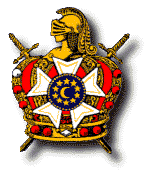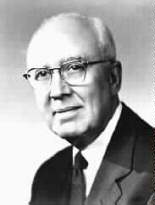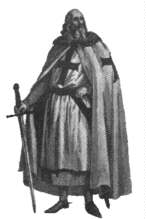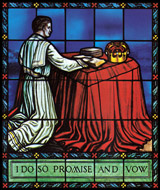|
|
 |
 |
|

What is the Order of DeMolay?
The Order of DeMolay was started over 70 years ago in Kansas City, Missouri. DeMolay
is a character building organization for young men who are twelve years of age and completed the 7th grade or who are 13 to
21 years of age. In over 700 chapters throughout the world, these young men have the opportunity to develop management, leadership
and social skills as they participate in community projects, sports, and other educational programs. DeMolay chapters are
located in the United States of America Canada, Brazil, Australia, Germany, Panama, Japan, Italy, and the Republic of the
Philippines.
More than one million young men have been members of DeMolay. Alumni members include John Wayne, Pete
Rose, Walt Disney, Dan Rather, Willard Scott, Burl Ives, Bill Clinton and countless others. DeMolay's alumni are distinguished
leaders including several politicians, businessmen, artists, astronauts, athletes, and major corporation presidents.
DeMolay is dedicated to providing a safe environment in an organization for young men who govern and direct their own
activities under the "advisorship" of adults. The organization develops leadership skills and character building
in the young men who work within the organization. It helps members to develop civic awareness and responsibility.
DeMolay provides young men the opportunity to practice leadership techniques and the real world application of the same
through its chapter activities.
The organization assists young men in growing into responsible adults with good
moral character while providing them a place to go, have fun, companionship, be accepted by peers and develop solid values.
DeMolay is not only teaching young people about the working tools of life, it is serving as the cornerstone of our next generation.
|
 |
 |
 |
|

A Brief History of the Order
The Order of DeMolay was founded in 1919, in Kansas City, Missouri, by a young man
named Frank S. Land. Land was a community leader who, at the age of 28, already had a successful business career as a restaurateur
behind him.
The main event that lead to the founding of the DeMolay movement was World War I. This was a time when
the nation was caught up with a passion and desire to bring democracy to the world. When the United States joined in the fight
against German power, every resource of men and materials was poured into the war effort. America suffered not only the loss
of its men who had fallen in battle, but on the homefront as well. A positive response to this critical situation came about
with the development of many charitable organizations. Frank S. Land was selected to act as the director of the Masonic Relief
and Employment Bureau of the Scottish Rite of Freemasonry. This charity would come to help hundreds and hundreds of families.
Near the end of the war, Land became concerned with the problems of boys who had lost their fathers. He thought
"how lonely it must be for a boy not to have a man to talk with, or a man to provide some type of inspiration and direction."
Frank decided there was a need for an organization where boys would have the opportunity to associate with other boys, a place
they could share common interests, learn responsibility and other skills that would benefit them throughout their lives. His
ideal model for this organization included having business or professional men, Masons, taking interest in the young people,
being a friend to them, advising them, and perhaps even providing them with employment opportunities.
In March,
1919, Land met with young Louis Lower. Louis' father had died, leaving the young man without a father figure in his life.
Land took the time to listen to Louis, learn about his dreams, and to help him. He learned that others, like Louis, sought
companionship, leadership, inspiration and competition. He asked Louis to invite some friends to a meeting, the original group
of nine DeMolays: Louis G. Lower, Ivan M. Bentley, Edmund Marshall, Gorman A. McBride, Jerome Jacobson, William W. Steinhilber,
Elmer Dorsey, Clyde C. Stream, and Ralph Sewell. At the second meeting, there was a total of 31 young men present. They were
excited about their new club!
The group needed its own identity and its own name. After Dad Land related the story
of Jacques DeMolay, the group decided to name itself for this historical figure connected with Masonry.
Dad Land,
as he came to be called, provided the philosophy and principles to be embodied. As interest in DeMolay spread, Land answered
many requests for information and authority to start chapters. Initiations and ceremonies took place in all locations. By
the fall of 1920, Mother Chapter had developed activities for its members as well. These included an outstanding baseball
team, a DeMolay marching unit, and even a 100-piece band!
By the end of 1921, Dad Land realized he had to devote
full time to this new organization and become a full time DeMolay employee. As DeMolay chapters grew in numbers and strength,
the organization as a whole grew in prestige. With this greater prestige, interest developed in the Masonic fraternity. Official
recognition and approval by Masonic groups began giving their seal of approval to foster DeMolay in their states. Many distinguished
organizations endorsed DeMolay including the General Grand Chapter of Royal Arch Masons, Grand Lodges, Knights Templar, etc.
A devoted champion of Freemasonry and of its teachings, Land would become a figure of international prominence
within Masonry, eventually becoming Imperial Potentate of the Shrine of North America. He counted among his friends U.S. Congressmen,
state governors, movie and radio stars, military leaders, leaders of industry, Presidents of the U.S. and a veritable legion
of young men in their teens.
Dad Land worked tirelessly for the Order of DeMolay until his death on November 8,
1959. Hundreds of other devoted workers aided in the creation and extension of the Order of DeMolay, but looked to one man
for guidance. Frank S. Land was the charismatic leader of the Order. Frank S. Land was truly a great man, a proud American,
and a person who came to be known by millions, simply as "Dad". Frank Land's life touched, and continues to impact
generation after generation of young people, young men looking to better themselves by emulating the lessons and examples
by which he himself lived.
|
|
|
 |
|
 |
 |
 |
|

Our Namesake
Jacques DeMolay was born in Vitrey, Department of Haute Saone, France in the year 1244. At the age
of 21, DeMolay joined the Order of Knights Templar.
The Knights Templar was an organization sanctioned by the
Roman Catholic Church in 1128 to guard the road between Jerusalem and Acre, an important port city on the Mediterranean Sea.
The Order of Knights Templar participated in the Crusades and earned a name for valor and heroism.
With many nobles
and princes sending their sons to join the Knights Templar, the Order also became very wealthy and popular throughout Europe.
In 1298, Jacques DeMolay was named Grand Master of the Knights Templar, a position of power and prestige. As Grand
Master however, Jacques DeMolay was also in a difficult position. The Crusades were not achieving their goals. The non-Christian
Saracens defeated the Crusaders in battle and captured many vital cities and posts. The Knights Templar and the Hospitalers
(another Order of Knights) were the only groups remaining to confront the Saracens.
The Knights Templar decided
to reorganize and regain their strength. They traveled to the island of Cyprus, waiting for the general public to rise up
in support of another Crusade.
Instead of public support, however, the Knights attracted the attention of powerful
lords, who were interested in obtaining their wealth and power. In 1305, Philip the Fair, King of France, set about to obtain
control of the Knights Templars. They had been accountable only to the Church. To prevent a rise in the power of the Church,
and to increase his own wealth, Philip set out to take over the Knights.
The year 1307 saw the beginning of the
persecution of the Knights. Jacques DeMolay, along with hundreds of others, were seized and thrown into dungeons. For seven
years, DeMolay and the Knights suffered torture and inhuman conditions. While the Knights did not end, Philip managed to force
Pope Clement to condemn the Templars. Their wealth and property were confiscated and given to Philip's supporters.
During years of torture, Jacques DeMolay continued to be loyal to his friends and Knights. He refused to disclose the
location of the funds of the Order and he refused to betray his comrades. On March 18, 1314, DeMolay was tried by a special
court. As evidence, the court depended on a forged confession, allegedly signed by DeMolay.
Jacques DeMolay disavowed
the forged confession. Under the laws of the time, the disavowal of a confession was punishable by death. Another Knight,
Guy of Auvergne, likewise disavowed his confession and stood with Jacques DeMolay.
King Philip ordered them both
to be burned at the stake that day, and thus the story of Jacques DeMolay became a testimonial to loyalty and friendship.
|
|
|
|
 |
|

DeMolay: Virtues, Ideals, & Symbols
DeMolay is based on "Seven Cardinal Virtues", which all DeMolays
vow to uphold during their Initiation into the Order. They are Filial Love, Reverence for Sacred Things, Courtesy, Comradeship,
Fidelity, Cleanness, and Patriotism. Filial Love is a DeMolay's pledge to love his parents and family. Reverence for Sacred
Things is a DeMolay's pledge to be true to God and his religion. Courtesy is a DeMolay's pledge to be courteous, not only
to his friends, but all people with whom he is in contact. Comradeship is a DeMolay's pledge to band together with other DeMolays.
Fidelity is a DeMolay's pledge to honor his promises, be true to his vows, and loyal to his fellow brothers at all costs.
Cleanness is a DeMolay's pledge to keep his body, mind, and heart clean. Patriotism is a DeMolay's pledge to be a good citizen
of his country and be prepared to defend his country in times of war.
DeMolay is founded on three prinicpal bulwarks,
which all DeMolays vow to defend during their Initiation into the Order. They are Religious Liberty, represented by the Holy
Bible, Civil Liberty, represented by the Country's Flag, and Intellectual Liberty, represented by the School Books. Every
DeMolay believes in God, and the Holy Bible does not represent a specific religion, but, rather, the importance of a belief
in God and an active religious life. Every DeMolay champions the government and its importance in maintaining the religious
freedom we enjoy. Every DeMolay believes in the public schools of our country and knows that without Intellectual Liberty,
neither Civil Liberty or Religious Liberty would be possible.
The three principal officers of the Chapter symbolize
the pathway of life. The Master Councilor, who sits in the East, symbolizes the rising sun and the beginning of life: youth.
The Senior Councilor, who sits in the West, symbolizes the setting sun and the ending of life. The Junior Councilor, who sits
in the South, symbolizes the meridian sun and the middle years of life.
|
|
 |
 |
 |
|



